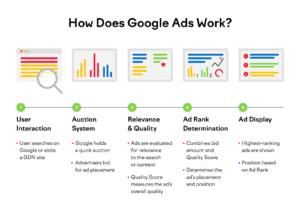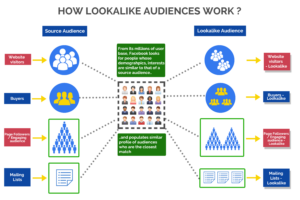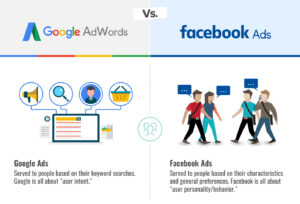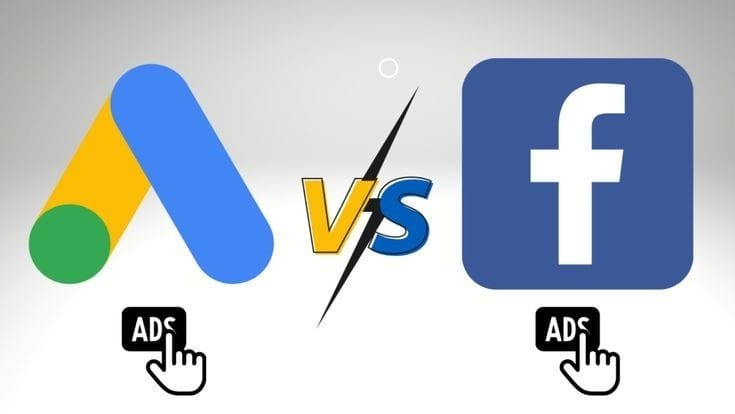In world of digital marketing, the quest for online dominance is a constant battle. Two titans of online advertising, Google Ads and Facebook Ads, have been vying for supremacy, each with their own strengths and weaknesses. As a business owner or marketer, navigating the complex landscape of online advertising can be daunting, especially when it comes to deciding which platform to allocate your precious budget to. With billions of users and several targeting options, both Google Ads and Facebook Ads offer immense potential for reaching and converting your target audience. But, which one is the best choice for your business? In this post, we’ll look into the key differences between Google Ads and Facebook Ads, exploring their unique features, advantages, and disadvantages, to help you make an informed decision and click your way to success.
What are Google Ads?
Google Ads, formerly known as Google AdWords, is an online advertising platform that allows businesses to display targeted ads on Google search results pages, other websites, and even mobile apps.
How do Google Ads work?
1. Campaign setup: You define your target audience, budget, and advertising goals (conversions, website traffic, etc.).
2. Keyword selection: You choose specific keywords relevant to your offerings, ensuring your ads appear when users search for those terms.

3. Bidding system: You set a maximum amount you’re willing to pay each time someone clicks your ad (pay-per-click or PPC).
4. Ad display: Google displays your ad in relevant search results pages or partner websites based on a combination of factors like keyword relevance, ad quality score, and bid amount.
Examples of Google Ads:
- Scenario: You own a bakery specializing in gluten-free treats.
- Keyword: “gluten-free bakery near me”
- Ad: “Craving Delicious Gluten-Free Treats? Visit [Your Bakery Name] for Fresh-Baked Goodies! Free Delivery Over $50.”
Benefits of Google Ads:
- Targets users with high purchase intent (actively searching)
- Laser-focused reach with specific keyword selection
- Measurable results with detailed analytics
Facebook Ads: Social media engagement
What are Facebook Ads?
Facebook Ads is an advertising platform allowing businesses to create targeted ads displayed within Facebook feeds and on Instagram (owned by Facebook).
How do Facebook Ads work?
1. Campaign creation: Define your target audience based on demographics, interests, behaviors, and even life events.

2. Ad format selection: Choose from various ad formats like images, videos, carousels, or stories to showcase your products or services.
3. Budget & bidding: Set a daily or lifetime budget and choose a bidding option based on your goals (clicks, impressions, conversions).
4. Ad placement: Facebook displays your ads within users’ feeds based on targeting criteria and ad relevance.
Examples of Facebook Ads:
- Scenario: You sell handmade yoga mats.
- Target Audience: People interested in yoga, fitness, or healthy living (based on demographics and interests).
- Ad Format: Eye-catching video showcasing your yoga mats in action, highlighting their unique features and benefits.
Benefits of Facebook Ads:
- Broad audience reach with diverse targeting options
- Builds brand awareness and fosters engagement
- Drives website traffic and lead generation
Google Ads and Facebook Ads differences
Round 1: Understanding intent
- Google Ads: Think “active search.” Here, users are actively searching for products or services related to their needs. Your ads appear alongside search results, targeting users with high purchase intent. Imagine someone searching for “best running shoes for women” – your ad for a top-rated running shoe brand could appear at the perfect moment.
- Facebook Ads: Think “passive discovery.” Users browse their Facebook feeds, encountering your ads amidst posts and updates. This platform allows for broader targeting based on demographics, interests, and behaviors. Imagine someone scrolling through Facebook who, based on their fitness interests, sees your ad for a new smartwatch that tracks running performance.
Round 2: Targeting techniques
- Google Ads: Offers laser-focused keyword targeting. You choose specific keywords relevant to your offerings, ensuring your ads reach users actively searching for those terms. Additionally, Google Ads allows for demographic targeting based on factors like age, location, and income.
- Facebook Ads: Boasts unparalleled audience granularity. You can target users based on a vast array of demographics, interests, behaviors, and even life events. Imagine targeting people who recently purchased gym memberships or those interested in fitness challenges.

Round 3: Campaign goals
- Google Ads: Excels at driving immediate action, ideal for businesses focused on conversions like online purchases, phone calls, or lead generation.
- Facebook Ads: Shines in brand awareness and lead generation. Use Facebook Ads to build brand recognition, nurture leads through the sales funnel, and drive traffic to your website.
So, who wins the championship belt?
The answer, dear entrepreneur, depends on your business goals and target audience. Here’s a quick cheat sheet to guide your decision:
Choose Google Ads if:
- You want to target users actively searching for your products or services.
- Conversions (sales, leads) are your primary goal.
- You have a well-defined target audience with specific search terms.
Choose Facebook Ads if:
- You want to build brand awareness and brand loyalty.
- You have a broad target audience with diverse interests.
- You want to nurture leads and drive website traffic.
The ultimate power move: Combining forces
You’ve learned the strengths of each individual platform, and now it’s time to unleash their true potential – as a tag team! Here’s how to leverage Google Ads and Facebook Ads together to create a well-rounded digital marketing strategy that packs a punch:
Building the dream team:
- Define your goals: Clearly define your overall marketing goals. Are you aiming for immediate conversions or brand awareness and lead nurturing?
- Assign roles: Based on your goals, assign roles to each platform. Google Ads can drive high-intent conversions, while Facebook Ads build brand awareness and nurture leads at the top of the funnel.
- Coordinate the plays: Ensure seamless collaboration. Maintain consistent messaging and brand identity across both platforms, creating a unified customer experience.
Executing the winning strategy
- Retargeting power: Reconnect with website visitors who interacted with your brand but didn’t convert. Use Facebook Ads to showcase targeted ads reminding them of your offerings and enticing a purchase.
- Brand awareness boost: Run Facebook Ads campaigns to build brand recognition. Target users with relevant interests, even if they’re not actively searching, to establish your brand in their minds.
- Website traffic generation: Drive qualified traffic through Facebook Ads. Target users likely interested in your products and entice them to visit your website for more information or to make a purchase.
Measuring success and optimizing the playbook
- Track performance: Closely monitor the performance of both campaigns. Analyze key metrics like clicks, conversions, cost-per-acquisition (CPA), and return on ad spend (ROAS) for each platform.
- Refine and repeat: Based on your data, identify what’s working well and what needs improvement. Continuously optimize your campaigns by adjusting targeting parameters, ad copy, creatives, and budget allocation across both platforms.
Google Ads vs Facebook Ads FAQs
Q: Which platform is better?
There’s no single “better” platform. It depends on your business goals and target audience.
- Focus on conversions? Google Ads is ideal.
- Aiming for brand awareness? Facebook Ads shine.
Q: Can I use both platforms together?
Absolutely! Combining Google Ads and Facebook Ads creates a powerful tag team strategy.
Q: How much does it cost?
Costs vary depending on your bidding strategy, competition, and campaign goals.
Google Ads vs Facebook Ads FAQs: Choosing Your Champion (Continued)
Here are some additional FAQs to help you choose the right platform for your business:
Q: What if my target audience is really specific (like dentists specializing in pediatric dentistry)?
Both platforms offer advanced targeting options. Google Ads allows for specific keyword targeting (e.g., “pediatric dentist near me”). Facebook Ads enables targeting based on demographics (dentists), interests (pediatrics), and even behaviors (users who recently searched for “children’s dental care”).
Q: I want to target people who have already visited my website. Can I do that?
A: Yes! Both Google Ads and Facebook Ads offer retargeting campaigns. You can create ads specifically for users who interacted with your website but didn’t convert, reminding them of your offerings and enticing them to take action.
Q: How can I measure the success of my campaigns?
Both platforms offer detailed analytics dashboards. Track key metrics like clicks, impressions, conversions, cost-per-click (CPC), and return on ad spend (ROAS) to see what’s working and what needs improvement.
I’m new to online advertising. How can I optimize my campaigns for better results?
Both Google Ads and Facebook Ads offer a wealth of resources and tutorials. Additionally, consider A/B testing different ad variations, headlines, and visuals to see what resonates best with your audience.
Q: What about platforms like Instagram Ads or YouTube Ads?
While this blog focused on Google Ads and Facebook Ads, other platforms can be valuable additions to your digital marketing strategy. Consider your target audience and campaign goals when deciding which platforms to use.
Q: Should I hire a professional to manage my online advertising campaigns?
There’s no right or wrong answer. If you’re new to online advertising or have a complex campaign, consider hiring a professional to ensure optimal performance.
Conclusion
In the end, the age-old question of which advertising platform reigns supreme – Google Ads or Facebook Ads – is not a simple one to answer. Both platforms have their unique strengths and weaknesses, and the choice between them ultimately depends on your business goals, target audience, and marketing strategy. If you’re looking to target users who are actively searching for products or services like yours, Google Ads may be the way to go. On the other hand, if you’re looking to build brand awareness, drive website traffic, and target specific demographics, Facebook Ads could be the better choice. Ultimately, the key to success lies in understanding your target audience and choosing the platform that best aligns with their online behavior.

